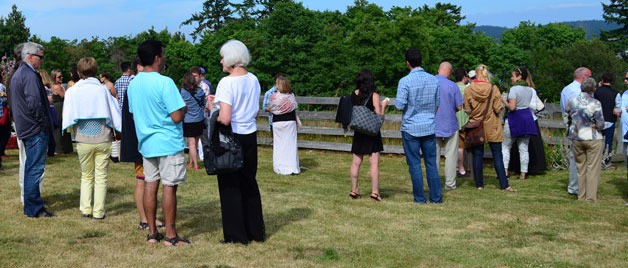In the middle of a field, overlooking dark blue Puget Sound, a long table stretches as far as the eye could see.
Each place setting is perfectly aligned and includes a goblet, napkin, fork and knife. The sun shined down over the golden grass as the white tablecloth blew flaps in the warm, summer breeze.
A few yards away, meat sizzles on the grill as chef Renee Erickson prepares a dinner for 158 people.
With the help of her staff, Erickson served a four-course meal July 10 for guests from across the United States as part of the Outstanding in the Field tour.
Erickson, owner of Seattle restaurants Boat Street, The Walrus and the Carpenter, and the Whale Winds, made dinner using Whidbey Island-grown products.
She strives to promote local, sustainable farming.
Whidbey Island’s Outstanding in the Field was held at the Farm at Double Bluff in Freeland.
Other such feasts happen all over the United States and Canada from May through November.
Outstanding in the Field began in the summer of 1998, when founder Jim Denevan was living in Santa Cruz, Calif. His brother owned an orchard in California where Denevan worked. He had the idea to bring a chef out to the farm to a cook a meal.
The first dinner drew 50 people.
Since those early days, it has grown exponentially.
While many local people attend the dinners at various locations, some fly across the United States for a new experience.
First timer Robert McKinnon flew from Dallas, Texas for the Whidbey Island dinner, as did Melissa Lamey, who traveled from San Antonio, Texas.
There are also a fair amount of regulars who choose a different dinner in a different part of the country each year.
Mark Zuercher has attended four dinners, three in California and the fourth on Whidbey Island. He is planning to attend a fifth dinner in Jackson Hole, Wyo. later this month.
He said he bases his travel plans on where his next dinner is going to be.
Although the location of the dinner may change, the purpose remains the same. The event strives to give information as well as create awareness of the farm. Dinner guests can see where their food comes from as well as enjoy a four-course meal prepared by a local chef.
Anna Gelb, a crew member for Outstanding in the Field, said she sees the value in people learning where their food comes from.
“People, especially in this region, are pretty aware of eating local and supporting organic, sustainable farming practices,” Gelb said. “But until you actually come out to the farm and see for yourself how animals are raised or how vegetables are being grown, then you can actually make that connection between something out on a farm and on your plate, and that’s when you actually put everything together.”
The menu at the Farm at Double Bluff was seafood heavy because of the abundance in the area. There was an oyster bar that served Hama Hama “seacow” oysters with fresh lemon and mignonette at the reception along with various appetizers such as seven minute Double Bluff green herb aioli and Little Brown Farm chévre with pickled cherry tomatoes. Dinner followed, which included Hama Hama clams, Willowood Rockwell beans, lemon peel, vermouth and cream. The next course was fresh grilled wild king salmon, served with cold mussel salad, cucumber, fennel, new potatoes, and coriander vinaigrette. The final course was juicy, grilled Double Bluff rib eye, tenderloin and New York beef, chermoula yogurt, pickled beets, and grilled onions. Dessert included Little Brown Farm butter biscuits with fresh berries and soft whipped cream. Each meal cost $190.
Whidbey Island farmers said they benefitted from taking part in Outstanding in the Field.
Vicki Brown, owner of the Little Brown Farm, supplied goat cheese for the dinner.
She said most chefs just try to prepare the best tasting food possible, but the chefs with Outstanding in the Field are different.
“The chefs that you meet over there understand the farm, understand the farmer, understand the animals and the sacrifices,” Brown said.
Georgie Smith, owner of Willowood Farm, said she made connections with the guests through her products. She enjoyed seeing people eat first-class food in an outdoor setting.
Americans have a lot of food in this country, but they don’t know where it comes from.
Through the hard work of the many crew members, farmers and cooks, people were able to take time from their daily lives and enjoy a homegrown meal together.


